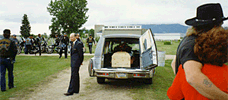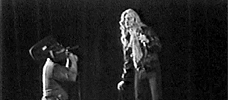Reviews
Barry Jenkins
USA, 2008
Credits
Review by Rumsey Taylor
Posted on 28 May 2008
Source 35mm print
Categories The 2008 Independent Film Festival of Boston
Medicine for Melancholy consists almost entirely of the rapport between two people in courtship. It begins without any dialogical exchange between them, as they wake up in the early morning aftermath of a one-night stand. They brush their teeth with their fingers and agree hesitantly to breakfast at a nearby diner, at which they’ll exchange names for the first time. The scenario is one of emotional disorientation; everything is stark and awkward and unfamiliar, and there’s at first a distance to the film. It’s observing these characters, and their quiet exchanges - a joke that doesn’t result in laughter, agreeing, again hesitantly, to hail a cab - emerge after extended silences. She is eager to get home and forget about this whole ordeal; he’s mining for some sort of gem that will unite them in conversation, but it will only be obtained after a great amount of labor.
The film does not retain the passivity of its opening scenes, and I don’t feel it concerns these two people in particular. The film is more ambient than my description will convey, and it doesn’t feel scripted or directed in as much as it feels naturally funny and relaxed. Watching it I was impressed by how the actions it contains felt as if they emerged without the camera’s coercive gaze. After Micah and Angela - the he and she mentioned above - part ways, you’re eager for them to meet again because of Micah’s indomitable, if unarticulated desire to just be in her presence.
Much of the film rests on Micah’s social peculiarity—he’s a “character” that is regularly unpredictable. Once he locates Angela, he’s reluctantly welcomed into her apartment and met with the same distanced silence as in the opening scenes, which he responsibly interrupts by playing the theme to Mr. Rogers’ Neighborhood on guitar. It’s the best icebreaker imaginable, verifying both the film’s authentic humor and tenderness. Angela has no option other than to acknowledge Micah’s playful goofiness.
The two spend the remainder of the day (and night) together, and we follow them throughout it: to a museum, on some errands, back to Micah’s apartment for a nap, out to a bar, and so forth. These events are staged to some extent, certainly. But again, none of it feels predetermined; rather it subsists on each’s increasing fondness of the other, and our increasing fondness for them. Medicine for Melancholy isn’t outwardly a romantic film—it’s better described as an adorable one, the characters expressing their interest playfully and not libidinously. It’s happy without dramatizing happiness.
Medicine for Melancholy has at its heart, however, a spirit of social and racial activism that becomes increasingly manifest in Micah’s character. He is black, and so is Angela, but race is more an afterthought for her (supposedly her current boyfriend is white, but he is never seen in the film). Micah’s attraction to Angela is biased because of their shared race, and this bias is sublimated in Micah’s actions; he’s more persistent than he would be with another girl. He’s not attracted to her on the sole basis of her beauty, and she appreciates this, I imagine, but Micah is compelled to pronounce the value of race, and in sustaining it. This makes him increasingly antagonistic. This courtship begins as a diversion from everyday strife, but such strife ultimately informs each character’s social mores. They’re conditioned to live certain ways with only reasonable diversions.
The film is about the fantasy of meeting someone new and becoming so captivated by this person that your essential customs become suddenly amenable, based on your perception of what this other person perceives of you. But people grow more circumspect as they get older. This initial self-criticism is impermanent, and the relationship must allow compromise, both with oneself and the other. As such, the effable ambiance of Medicine for Melancholy’s opening blows over, and the film becomes more reconciliatory as it proceeds, like two satellites orbiting erratically around each other before they stabilize in a constant gravity.
More The 2008 Independent Film Festival of Boston
-

Crawford
2008 -

Vexille
2007 -

American Teen
2008 -

Mister Lonely
2007 -

Intimidad
2008 -

Meadowlark
2008 -

Second Skin
2008 -

Transsiberian
2008 -

The Linguists
2008 -

Big Man Japan
2007 -

At the Death House Door
2008 -

The Beaver Trilogy
2000 -

The Beaver Trilogy
2000 -

Nerdcore Rising
2008 -

Goliath
2008 -

The Tracey Fragments
2007 -

Saviours
2008 -

Medicine for Melancholy
2008 -

Severed Ways
2007 -

Not Your Typical Bigfoot Movie
2008 -

Not Your Typical Bigfoot Movie
2008 -

Jump!
2007 -

Encounters at the End of the World
2007
We don’t do comments anymore, but you may contact us here or find us on Twitter or Facebook.



